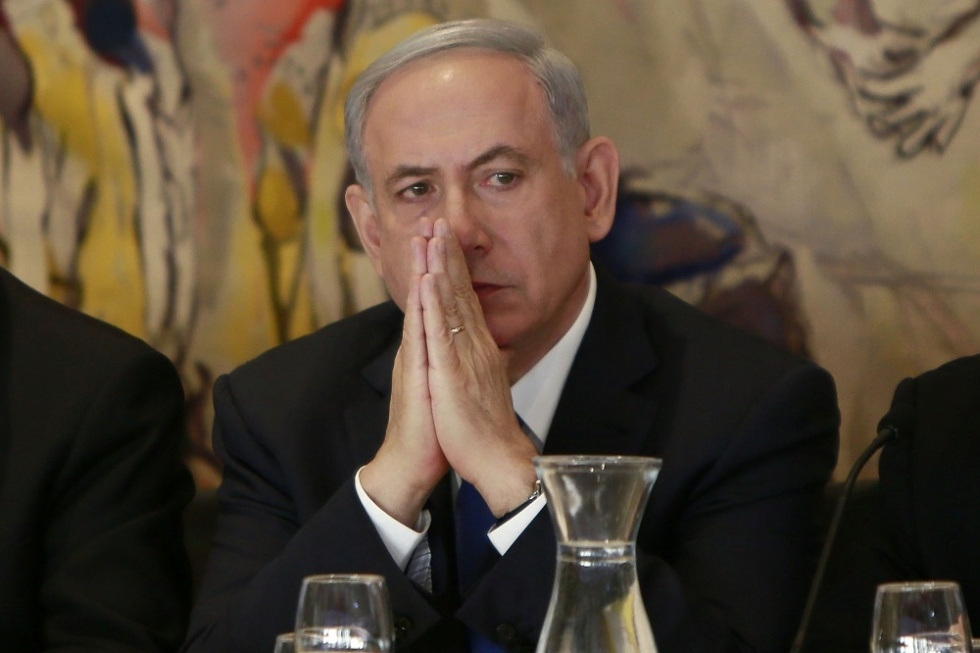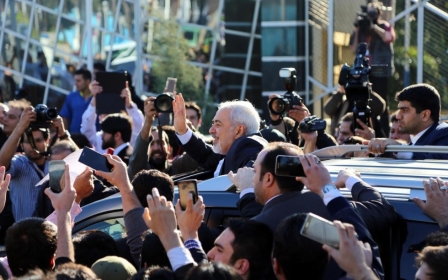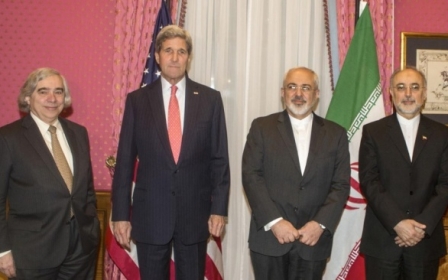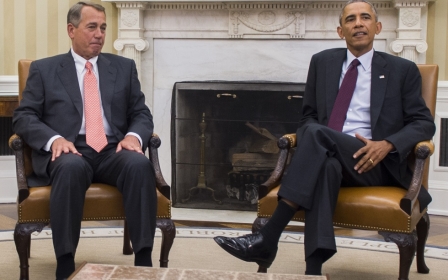Netanyahu is searching for allies

At the same time as EU foreign policy chief Federica Mogherini and Iran's Foreign Minister Mohammad Jawad Zarif were announcing the historic deal that was reached in Lausanne on Thursday evening, the Israeli army was on full alert. This was not out of fear of a possible Iranian assault, but because of fear that a young Israeli man had been kidnapped in the West Bank. The live coverage of the news conference with Mogherini and Zarif was interrupted time and again by live reports coming from the site of the supposed kidnapping that took place in Hebron.
A few hours later it turned out that the kidnapping story was a false alert. The 22-year-old Israeli had staged his "disappearance" near a Palestinian village as part of a plan to reappear after a few days, claiming that he released himself from Hamas's captivity. This act of bravery, he believed, would convince his girlfriend to come back to him.
This small play led the Israeli chief of staff into emergency consultations, and sent thousands of soldiers into house searches in Palestinian villages around Hebron. But besides the millions of dollars spent on this vane operation and the harassment suffered by the Palestinian villagers, this alleged kidnapping could serve as a metaphor as to how easy it is to spread fear in Israeli society - whether it is done by a young man wanting to renew his lost love or by an Iran deal which Prime Minister Benjamin Netanyahu described as "dangerous to mankind".
As expected, Netanyahu led his cabinet ministers to unitedly oppose the "bad deal" with Iran, claiming that instead of reducing Teheran's nuclear capability, it will pave its way towards a nuclear bomb. Commentators in Israel were less intransigent towards the deal. Naum Barnea, a leading political analyst, wrote in Yedioth Ahronoth that the deal "is much better than Israel's pessimists expected".
Alex Fishman, a leading defence analyst from the same newspaper, claimed that "our American friends sold us for nothing," but even he admitted that Israel would have an alert of at least one year before the Iranians would be able to build a bomb. All in all, the impression is that Israel was somehow surprised from the comprehensiveness of the deal and that it expected much less strict control over Iran's nuclear programme.
As the final agreement has yet to be signed, the details are not altogether clear. They are certainly not clear to the Israelis, but neither even to the Americans and Iranians, as the exchange of words between the two sides since last Thursday seem to indicate.
But this is of less importance now. Netanyahu's Israel would have been opposed to any deal with Iran, no matter what the details would be. He views Iran - with or without nuclear weapons - as a constant threat to Israel. So whenever Iran gets stronger, be it economically, politically or militarily, Israel gets weaker - a typical zero-sum game.
Netanyahu is not going to give up soon. His campaign will now focus more on Iran being a danger to all of the "moderate" countries in the region such as Egypt and Saudi Arabia and Israel itself, regardless of its nuclear capability. Iran's alleged involvement in Yemen as well as in Iraq, Syria and Lebanon serves as pressing examples.
In order to stop Iran from doing what it does, goes this line of thinking, the US should demand a curb on Iran's missiles capability and its "aggressive" policy in general. Israel hopes it can find allies in the region and in Washington for such demands. The idea that Iran should recognise Israel as part of the final deal takes this even further. The nuclear deal is conceived as an opportunity to "educate" Iran.
Such a recognition is, of course, not on the table, but it may indicate a shift in Netanyahu's strategy. Instead of rejecting any deal altogether, he will try raising demands which the international community may deem as reasonable.
It worked quite well with Netanyahu's demand that the Palestinians recognise Israel as a Jewish state and, adopted by the same American administration, it helped to stall the negotiations with Palestinian President Mahmoud Abbas. It may help to stop a deal with Iran.
But in order to adopt a more flexible policy, one which does not reject a deal with Iran but only asks to ameliorate it, Netanyahu may need moderate-looking partners in his new government. With right-wing extremists such as Avigdor Lieberman or Naftali Bennet as foreign minister, it will be difficult for Netanyahu to convince the world that he just wants a better deal; although with Isaac Herzog from the Zionist Camp, his task will be easier.
Contrary to what could have been expected, Netanyahu is in no hurry to form a government with his "natural" right-wing allies. Two weeks have passed since the elections, and a new coalition is far from being a done deal, but a coalition with the Zionist Camps remains a possibility.
Herzog himself rejected a coalition with Netanyahu on the weekend, but Eitan Cabel, a senior leader in the Zionist Camp closely related to Herzog, wrote on Sunday on his Facebook page that "in front of nuclear Iran, there is no coalition or opposition, we are all Israelis". It may be a good excuse for forming a government of national unity under the leadership of a man, Netanyahu, who the Zionist Camp attacked vehemently during the election campaign.
Netanyahu's immediate goal is to prevent the signing of a final agreement with Iran by the end of June 2015. Even postponing such an agreement would be considered a success. A done deal with Iran will not only pave the way for changing the balance of power in the Middle East in a way unfavourable to Israel, but it will also deprive Netanyahu of his main - if not sole - issue in the last years: the Iranian nuclear threat.
As the staged kidnapping in Hebron last week has showed, it is not hard to put fear in the hearts and minds of Israelis. Netanyahu knows how to play upon these fears very well. With a nuclear deal with Iran and comprehensive inspections of its nuclear facilities, it will be more challenging for Netanyahu to depict himself as the only one capable of saving Israel from nuclear annihilation. This will be a major political blow.
If a final deal is signed, it will difficult to imagine Israel leading military action against Iran, as it will be conceived as an act of open defiance against the American administration and the other countries that are part of the agreement.
Only if a deal is postponed, then an Israeli attack is not impossible. But it would be highly unlikely. Such an attack may force the US to intervene and Israel could be blamed for the fact that it led American soldiers into war - and such a situation may prove even more dangerous to Israel than a nuclear Iran.
- Meron Rapoport is an Israeli journalist and writer, winner of the Napoli International Prize for Journalism for a inquiry about the stealing of olive trees from their Palestinian owners. He is ex-head of the News Department in Haaertz, and now an independent journalist.
The views expressed in this article belong to the author and do not necessarily reflect the editorial policy of Middle East Eye.
Photo: File photo of Israeli Prime Minister Benjamin Netanyahu (AFP)
Stay informed with MEE's newsletters
Sign up to get the latest alerts, insights and analysis, starting with Turkey Unpacked
Middle East Eye delivers independent and unrivalled coverage and analysis of the Middle East, North Africa and beyond. To learn more about republishing this content and the associated fees, please fill out this form. More about MEE can be found here.





